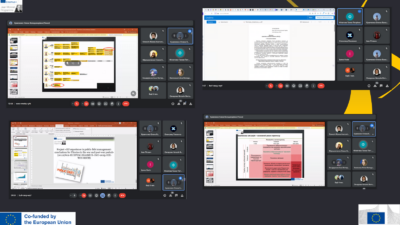The second part of the series of trainings on public debt management, the trainings “Conceptual framework for public debt management: the EU-Ukraine case”, which are conducted within the framework of the Jean Monnet module project “EU experience in public debt management: conclusions for Ukraine in the war and post-war period”, funded by the Erasmus+ program (101127602-EUEPDM-ERASMUS-JMO-2023-HEI-TCH-RSCH), has been completed. The second part of the trainings, which was implemented for students and teachers, under the guidance of Olena Kravchenko, PhD, Associate Professor, lasted from May to June 2024.
During the second part of the training series, the participants were actively engaged in studying the practical aspects of public debt management, in particular, they were introduced to topics covering debt security, financial transparency, the role of international financial institutions and other important aspects of debt management.
The participants had the opportunity not only to familiarize themselves with theoretical knowledge, but also to put it into practice through real-life tasks and exercises.
The organizers of the project encourage all those interested in further professional development to join future initiatives in the field of public debt management.
For more information and to register for the upcoming events, please fill out the registration form here: https://forms.gle/iAKfzK22NK782SSY7
To receive a file-based questionnaire, please send an e-mail to: a.filatova@biem.sumdu.edu.ua.
Invitations to the following events will be sent to registered participants at the email addresses specified in the registration form.
We will be glad to see you among the participants of the events!
Funded by the European Union. However, the views and opinions expressed are those of the authors alone and do not necessarily reflect the views of the European Union or the European Executive Agency for Education and Culture (EACEA). Neither the European Union nor EACEA can be held responsible for them.
